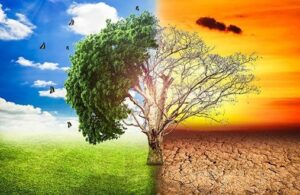 Our planet is no longer stable. Old certainties about the climate are evaporating as rising greenhouse gas emissions accelerate global warming. In June, a city in the Siberian Arctic recorded a temperature of 38C — 10C higher than the seasonal average. Data show that the Arctic is heating up twice as fast as the rest of the planet. Meanwhile, the South Pole is warming at three times the global rate. There is evidence that parts of Antarctica have crossed tipping points and that ice will melt irrecoverably on a vast scale.
Our planet is no longer stable. Old certainties about the climate are evaporating as rising greenhouse gas emissions accelerate global warming. In June, a city in the Siberian Arctic recorded a temperature of 38C — 10C higher than the seasonal average. Data show that the Arctic is heating up twice as fast as the rest of the planet. Meanwhile, the South Pole is warming at three times the global rate. There is evidence that parts of Antarctica have crossed tipping points and that ice will melt irrecoverably on a vast scale.
Deforestation of the Amazon rainforest is diminishing its capacity to store carbon. As early as 2035 it may flip from being a repository of carbon to an emitter, making it more difficult to restabilise the climate. We can say with a high degree of certainty that the conditions on the planet over the past 10,000 years, since leaving the Ice Age, have been astoundingly clement relative to the preceding million years — not too hot, not too cold, and, critically, predictable, allowing us to develop societies as we know them today.
According to the Exponential Roadmap — a multi-party report co-authored by the organisation that I head, the Potsdam Institute for Climate Impact Research — 36 solutions are needed to halve emissions by 2030. They range from greater use of wind power to more remote working to shifting towards plant-based diets. These must be rolled out in parallel.
Second, we must recognise that nature is our best friend. Half of all our emissions from fossil fuels are pulled out of the atmosphere by soils, forests and oceans. We have altered 50 per cent of Earth’s land surface, and we must stop. The science calls for zero loss of natural ecosystems from 2020 onwards.
Achieving this will amount to cheap insurance for future generations. Governments must provide the incentives to companies to enhance and restore forests, grasslands, wetlands and oceans to protect the rich diversity of life that these ecosystems support.
Kaynak: “Why We Need to Declare a Global Climate Emergency Now”, Financial Times
